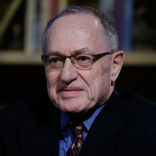CAMBRIDGE, Mass. (JTA) — Those who successfully challenged the nomination of Charles W. Freeman Jr. to become chairman of the National Intelligence Council should be praised for an act of high patriotism. It would have been disastrous for the United States to have, as the person responsible for overseeing “policy-neutral intelligence assessments” for the president, a zealot who is anything but policy neutral when it comes to two of the most important areas of international conflict.
Freeman not only has extremist views regarding the Middle East and China, but he has been beholden to lobby groups that are anxious to influence intelligent assessments regarding Saudi Arabia and China. Freeman bowed out when it became clear that his financial ties to the Saudi and China lobbies would be deeply probed by inspectors general, congressional staffers and the media.
Freeman is an ideologue who apparently believed that China should have been more aggressive in its crackdown on the peaceful Tiananmen Square protesters. At the same time, he has been critical of U.S. support for Israeli efforts to stop violent terrorists from blowing up Israeli school buses and firing rockets at Israeli kindergartens.
There is no rational explanation for why a smart intelligence official would be so irrational as to express more sympathy for brutal Chinese repression of peaceful dissent than for Israeli self-defense against violent terrorism. Freeman is an ideological zealot when it comes to the Middle East. U.S. Sen. Charles Schumer (D-N.Y.) correctly characterized his views as “over the top” and an “irrational hatred of Israel.”
Freeman acknowledged that he is deeply and emotionally committed to a fundamental change in U.S. policy toward Israel. That is certainly his right as a private citizen or even as an elected official. But his extremist views would not have served him or our nation well as the person responsible for what are supposed to “policy-neutral intelligence assessments.” An ideologue with such heavy financial baggage is simply incapable of policy neutrality, and he should have known that.
Any doubts about Freeman’s neutrality were eliminated with his over-the-top reaction to those who challenged his qualifications for the job based on his record. He railed against “the Israel lobby,” blaming it and it alone for his failure to get the job. Freeman ignored those human rights advocates who were outraged by his defense of the Chinese repression of the Tiananmen demonstrators and his unwavering support for the most repressive regime in the Middle East. He ignored environmentalists who worried that he was far too beholden to oil interests. And he ignored patriotic Americans who support the U.S. policy in the Middle East because they believe it is good for America, for democracy and for the war against terrorism.
Freeman was not alone in invoking the “power” of the Israel lobby and accusing it of unpatriotic actions. He teamed with Stephen Walt, the academic who has made a career recently of blaming all of America’s ills on “The Lobby.” Here is how Walt gleefully put it: “For all of you out there who may have questioned whether there was a powerful ‘Israel Lobby’ or admitted that it existed but didn’t think it had much influence … think again.”
Walt ignored the fact that the powerful Saudi, China and foreign oil lobbies were supporting Freeman because they believed, quite correctly, that his assessment of intelligence would be anything but neutral when it came to protecting their interests. He also ignored the fact that AIPAC, which Walt considers the puppet master of the Jewish Lobby, took no position on the Freeman nomination and that those who opposed it included critics of Israeli policies.
So let me understand the Freeman-Walt position. When the Saudi, the Chinese and foreign oil lobbies (with a small “l”) exercise their influence, that is freedom of speech and the right to petition the government. But when the Israel Lobby (capital “L”) challenges an appointment, such action is “dual loyalty,” “un-American” and “unpatriotic.” Their other position is that any time people of diverse backgrounds and views independently challenge a government decision that relates to the Middle East, this represents the collective action of the notorious and powerful Israel Lobby rather than the heartfelt views of individual patriotic Americans.
The truth is that the Freeman appointment was bad for America, bad for peace in the Middle East, bad for human rights in China, bad for Tibet, bad for the environment and bad for “policy-neutral intelligence.” Those who challenged it performed a patriotic duty. They should be praised for helping the Obama administration avoid a serious blunder that threatened to compromise the president’s ability to act in the interest of the United States on the basis of policy-neutral intelligence.
All Americans owe them a debt of gratitude.
(Alan Dershowitz is the Felix Frankfurter Professor of Law at Harvard Law School.)






